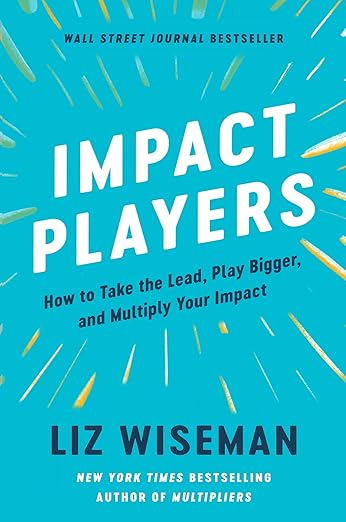Impact Players by Liz Wiseman

There are three types of contributors.
- Impact contributors: deliver high-value, impactful work.
- Typical contributors: talented individuals who confine themselves within defined tasks.
- Under contributors: talented individuals perform below their potential.
Being an impact player isn't about special talent; it's about adopting a differential mindset to thrive in ambiguous, dynamic environments.
Five traits that set impact players from ordinary contributors:
- Make yourself useful
- Step up, step back
- Finish strong
- Ask and adjust
- Make work light
1. Make yourself useful
opportunity is missed by most people because it is dressed in overalls and looks like work - Thomas A. edison
- There is a huge disconnect between the job description and the actual work. Companies seek the right candidates but struggle to hire for specific skills.
- We can increase our impact when we find problems that need to be solved and make ourselves useful to our organization. The value must be received and perceived by the customer or stakeholder.
- Instead of contemplating the work's scope for impact, start with your bosses's top priority.
2. Step up, step back
- Be agile. You will need help to figure out everything for ambiguous tasks. Keep the stakeholders in the loop and be open to change. The goal is to win as a team instead of enforcing your agenda.
- A good strategy has many thinkers but only one author.
- You need a stewardship mentality to lead, not an authoritative title.
- The best leaders create stability for their team by absorbing ambiguity.
- When you take on more responsibility, you make more money.
3. Finish stronger
- Finishing strong isn't about delivering at all costs. It's about working on the right set of things as we bring clarity, and see it through the completion.
- Expecting obstacles from the start is the surest way to overcome them. By anticipating problems, we can finish strong, even in the worst of circumstances.
- Success is about doing the right thing, not about doing everything right. Instead of finishing at all costs, you should cut your losses and let some projects go.
4. Ask and adjust
Intelligence is the ability to adapt to change - Stephen Hawking
- Relying on feedback gathered in the annual performance review won't suffice. When targets are continually moving, you need continual feedback, guidance, and correction so you can adjust your aim.
- If you want to have an impact amid moving targets, ask for guidance and adjust your aim.
- As a knowledge worker, never tie your identity to your work. Doing so will damage your well-being as it may rise and fall based on the project, performance review, and challenges you face in completing it. You're not your work. Your self-worth remains independent of your work performance.
- With a growth mindset, you are capable of learning and changing. so, interpret the feedback objectively to refine your skills.
5. Make work light
- Be succinct: there is too much work to get done, too many new tools and technologies to master, and more information than we all can process. The same technology that enables us to work anywhere also urges us to work everywhere and at all hours.
- Being ready to go when needed is a crucial feature.
For my new posts, subscribe.